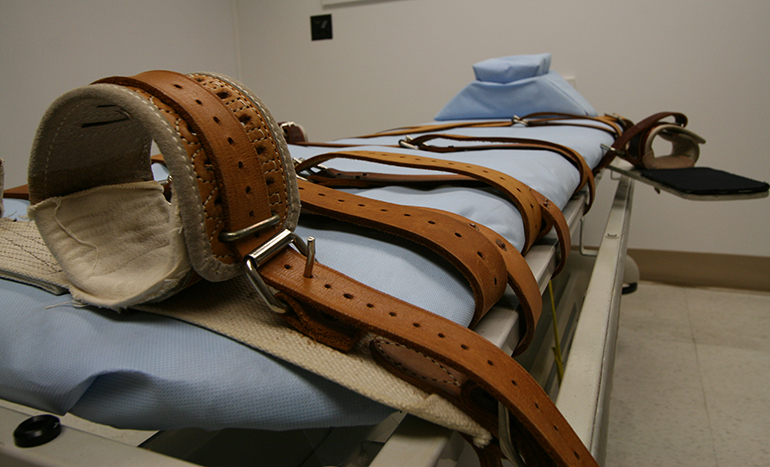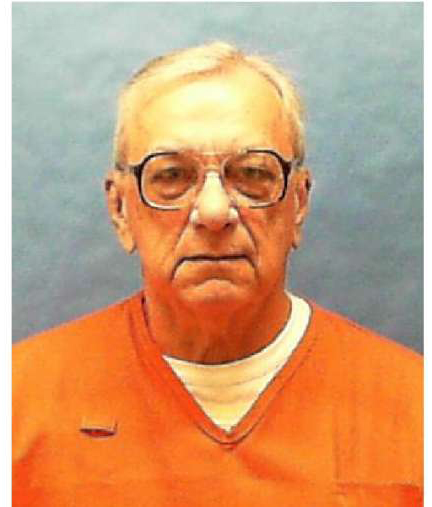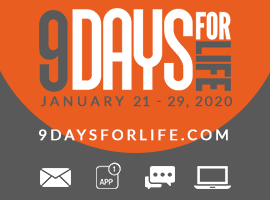By Jean Gonzalez - Florida Catholic - Orlando

Photographer: Florida Dept. of Corrections
View of the gurney in which Florida's death row inmates are executed.
ST. AUGUSTINE | Following Ron Wright’s presentation at the statewide Respect Life Conference last October, those gathered were welcome to ask questions concerning capital punishment. When someone asked why an executed individual might be innocent, the discussion revolved towards James Dailey, who was scheduled to be executed Nov. 7 — less than a month after the conference.
Although he has spent 32 years on Florida’s death row, Dailey’s case has recently garnered national attention. Dailey was convicted in the 1985 murder of Shelly Boggio, a 14-year-old from Kenneth City in Pinellas County. Although another man, who is serving a life sentence in the murder of the same victim, has stated he, and he alone, committed the murder, Dailey is still on death row.
Wright explained that, as with his own case, Dailey was convicted with wholly circumstantial evidence. This is one reason the case has garnered so much attention from organizations fighting the death penalty.

Photographer: FLORIDA DEPT. OF CORRECTIONS
James Dailey was convicted in the 1985 murder of Shelly Boggio, a 14-year-old from Kenneth City in Pinellas County. Although another man, who is serving a life sentence in the murder of the same victim, has stated he, and he alone, committed the murder, Dailey is still on death row.
“There is nothing more shocking than the thought of executing an innocent man. Yet, that’s what will happen if Florida proceeds with the execution of James M. Dailey,” said Seth Miller, executive director of the Innocence Project of Florida. “There is no physical or eyewitness evidence tying Mr. Dailey to this tragic crime. Prosecutors used discredited snitch testimony to wrongfully convict him. Jack Pearcy, a man with a history of violence against women, has admitted at least four times that he alone was responsible for the death of Shelly Boggio. Justice has been served in this case: Mr. Pearcy is serving a life sentence. The governor must stop Mr. Dailey’s execution before it’s too late.”
The case has also caught the attention of Florida’s bishops, who were among those urging DeSantis for a stay of execution in late 2019.
On Oct. 23, 2019, Archbishop Thomas Wenski and Bishop Felipe Estevez wrote a letter to the governor asking for a stay. In early October, Father Robert Schneider and Sabrina Burton Schultz, members of the Life, Justice and Advocacy Committee of the Catholic Diocese of St. Petersburg, wrote a letter to the Tampa Bay Times outlining how, “As Catholics, we are deeply troubled by the scheduled Nov. 7 execution of James Dailey. For people of faith and others of good will, it is shocking that Gov. Ron DeSantis plans to put to death a man who may well be innocent.”
A Florida court did grant a stay, which expired Dec. 30, 2019. At press time, DeSantis has not done anything to renew the death warrant. Now, Florida’s bishops and the Florida Conference of Catholic Bishops are urging the governor to grant a clemency, and asking local Catholics to lend their own voices in that effort.
While Catholic bishops have long fought to stop death warrants, there is added concern with Dailey’s case because of his possible innocence.
“Please schedule a clemency hearing,” wrote the Florida Conference of Catholic Bishops in another letter sent to DeSantis. “There is significant evidence of innocence that the courts have not yet considered, primarily due to procedural bars. However, it should never be too late for someone sentenced to death to prove their innocence.”
On Jan. 17, 2020, the U.S. bishops joined Florida’s bishops in submitting a brief to the U.S. Supreme Court asking for a new trial for Dailey. “The deeply troubling facts of Mr. Dailey’s conviction and death sentence raise profound moral questions,” the bishops wrote in the brief. “The evidence of Mr. Dailey’s actual innocence is not only credible; it is overwhelming.”
RECANTED
Pearcy, who was a housemate of Dailey’s at the time of the crime, was sentenced to life in prison because of his part in the murder. Prosecutors of the case said both men were involved in the murder, with Pearcy pinning the responsibility on Dailey in return for life in prison.
But since that time, Pearcy has recanted, and on Dec. 18, 2019, Pearcy voluntarily signed a declaration attesting to the fact that he alone committed the crime for which Dailey faces execution, and that Dailey was not involved in any way. This is at least the fifth time Pearcy has confessed to being solely responsible for the crime.
According to Dailey’s attorneys, Pearcy’s statement was more specific than any he has previously made. It reads: “James Dailey had nothing to do with the murder of Shelly Boggio. I committed the crime alone. James Dailey was back at the house when I drove Shelly Boggio to the place where I ultimately killed her.”
Along with Catholic bishops and the Innocence Project, former death row inmates have advocated for Dailey. In a letter written from Witness to Innocence, exonerees pleaded for Dailey in a letter to the governor, stating, “(T)he same types of evidence that led each of us to be exonerated are also present in James’ case. The only difference allowing us to be spared from execution while James is set to be killed, is whether or not the evidence had the chance to be fully reviewed.”

The New York Times and Pro Publica published an exhaustive account of the case and new evidence available, including information about Paul Skalnik, a “jailhouse snitch” who testified again and again, helping to send dozens of people to prison and four, including Dailey, to death row. The assistant state attorney who prosecuted Dailey recently admitted to the Tampa Bay Timesshe would not use Skalnik again because she could not trust his testimony was true. In that story, she also stated, “(Dailey’s case) was a circumstantial case, it’s not like there was an upstanding citizen eyewitness to the case. So, speculation is all we have as to what happened.”
Catholic Mobilizing Network, which works to end the death penalty, also sent a letter to DeSantis. “(We) do not forget the undeniable pain of the victim in this case, 14-year old Shelly Boggio, as well as the grief of her family. As a Church, we pray for the healing and peace of all victims of violent crime. We do not, however, condone the state’s planned execution as a form of justice — especially the execution of someone not responsible for the crime.”
Dailey, 73, is an honorably discharged Vietnam veteran who served three tours. If executed, he would be the 100th to be put to death in Florida since the reinstatement of the death penalty in 1976. Since reinstatement, 29 men have been exonerated and released from Florida’s death row, including Wright.
HOW TO HELP
- The Florida Conference of Catholic Bishops offers a link to send messages directly to the governor urging a clemency hearing. Visit flaccb.org/flcan-take-action and click on the first link.
- Letters can also be sent to Gov. Ron DeSantis urging him to stop the execution [email protected].
- To contact the governor by phone, call Monday through Friday, from 8 a.m. to 5 p.m., at 850-488-7146.

